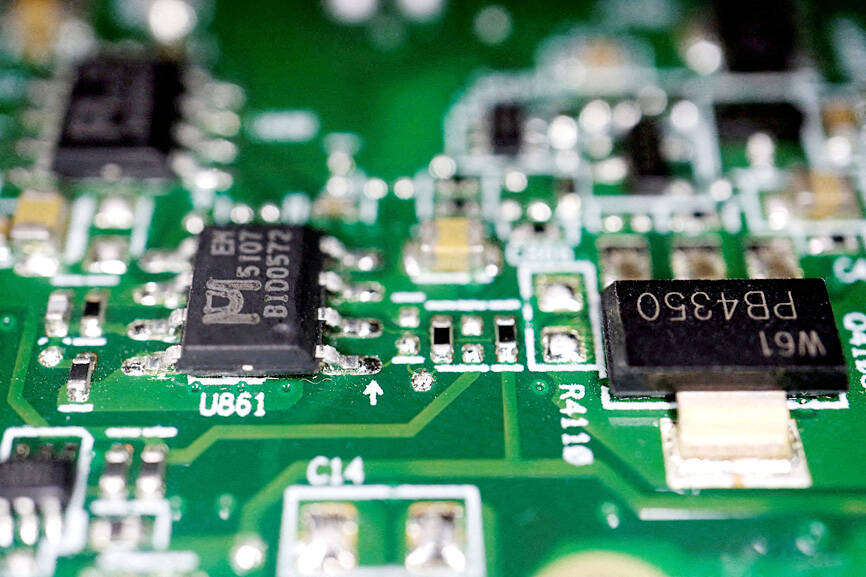The production value of Taiwan’s printed circuit board (PCB) industry is expected to return to yearly growth of 6.3 percent this year, backed by robust demand for advanced PCBs used in artificial intelligence (AI) applications and electric vehicles (EV), the Taiwan Printed Circuit Association said yesterday.
A pickup in the mobile phone, computer and semiconductor sectors would also help boost demand, the association said.
Overall production value of local PCB companies is forecast to expand to NT$818.2 billion (US$25.51 billion), compared with NT$769.8 billion last year, it said.

Photo: Reuters
“The trickle of AI applications into edge devices from cloud-based devices will stimulate demand for advanced PCBs this year,” the association said.
Demand for PCBs used in vehicles would continue to grow this year amid Beijing’s push for higher EV penetration in China and EV makers’ aggressive overseas deployments, the association said.
Last year, the production value of PCBs used in vehicles increased 2.8 percent annually, the only growth segment of the year, it said.
With PCB materials and manufacturing equipment included, the association said it expects the production value of the local PCB supply chain to advance 7.4 percent to NT$1.21 trillion this year.
Local PCB manufacturers’ total production value contracted 16.7 percent last year from a peak of NT$900 billion in 2022 as customers balked at placing new orders, the association said.
The three major PCB applications — communications, PCs and semiconductors — all dipped last year as high inflation, tight monetary policy and economic uncertainty dealt a severe blow to demand, it said.
Zhen Ding Technology Holding Ltd (臻鼎), the world’s largest PCB maker, last month told investors that the worst was over and that it expects its revenue to grow by a double-digit percentage this year.
Zhen Ding Technology Holding’s revenue last year dropped 11.55 percent to NT$151.56 billion from a year earlier.
On Monday, the company announced that it is to expand its production lines in China’s Shenzhen with an investment of 700 million yuan (US$96.74 million) in light of rising demand for consumer electronics and vehicles.
The company is also investing in a new production line in Kaohsiung to produce flexible PBCs and advanced PCB modules starting in the second half of this year, and plans to expand capacity in Thailand with a pilot run in the second half of next year, it said.
Taiwanese PCB manufacturers have continued to expand in Southeast Asian nations such as Thailand, Malaysia and Vietnam to cope with geopolitical tensions, but those production lines were still only a small portion, 2.7 percent, of their total production value in the fourth quarter of last year, the association said.
Taiwan contributed 31.7 percent to PCB makers’ total production value, behind China at 65.6 percent, it said, adding that China would remain a major PCB manufacturing hub.

SEMICONDUCTORS: The German laser and plasma generator company will expand its local services as its specialized offerings support Taiwan’s semiconductor industries Trumpf SE + Co KG, a global leader in supplying laser technology and plasma generators used in chip production, is expanding its investments in Taiwan in an effort to deeply integrate into the global semiconductor supply chain in the pursuit of growth. The company, headquartered in Ditzingen, Germany, has invested significantly in a newly inaugurated regional technical center for plasma generators in Taoyuan, its latest expansion in Taiwan after being engaged in various industries for more than 25 years. The center, the first of its kind Trumpf built outside Germany, aims to serve customers from Taiwan, Japan, Southeast Asia and South Korea,

Gasoline and diesel prices at domestic fuel stations are to fall NT$0.2 per liter this week, down for a second consecutive week, CPC Corp, Taiwan (台灣中油) and Formosa Petrochemical Corp (台塑石化) announced yesterday. Effective today, gasoline prices at CPC and Formosa stations are to drop to NT$26.4, NT$27.9 and NT$29.9 per liter for 92, 95 and 98-octane unleaded gasoline respectively, the companies said in separate statements. The price of premium diesel is to fall to NT$24.8 per liter at CPC stations and NT$24.6 at Formosa pumps, they said. The price adjustments came even as international crude oil prices rose last week, as traders

POWERING UP: PSUs for AI servers made up about 50% of Delta’s total server PSU revenue during the first three quarters of last year, the company said Power supply and electronic components maker Delta Electronics Inc (台達電) reported record-high revenue of NT$161.61 billion (US$5.11 billion) for last quarter and said it remains positive about this quarter. Last quarter’s figure was up 7.6 percent from the previous quarter and 41.51 percent higher than a year earlier, and largely in line with Yuanta Securities Investment Consulting Co’s (元大投顧) forecast of NT$160 billion. Delta’s annual revenue last year rose 31.76 percent year-on-year to NT$554.89 billion, also a record high for the company. Its strong performance reflected continued demand for high-performance power solutions and advanced liquid-cooling products used in artificial intelligence (AI) data centers,

SIZE MATTERS: TSMC started phasing out 8-inch wafer production last year, while Samsung is more aggressively retiring 8-inch capacity, TrendForce said Chipmakers are expected to raise prices of 8-inch wafers by up to 20 percent this year on concern over supply constraints as major contract chipmakers Taiwan Semiconductor Manufacturing Co (TSMC, 台積電) and Samsung Electronics Co gradually retire less advanced wafer capacity, TrendForce Corp (集邦科技) said yesterday. It is the first significant across-the-board price hike since a global semiconductor correction in 2023, the Taipei-based market researcher said in a report. Global 8-inch wafer capacity slid 0.3 percent year-on-year last year, although 8-inch wafer prices still hovered at relatively stable levels throughout the year, TrendForce said. The downward trend is expected to continue this year,